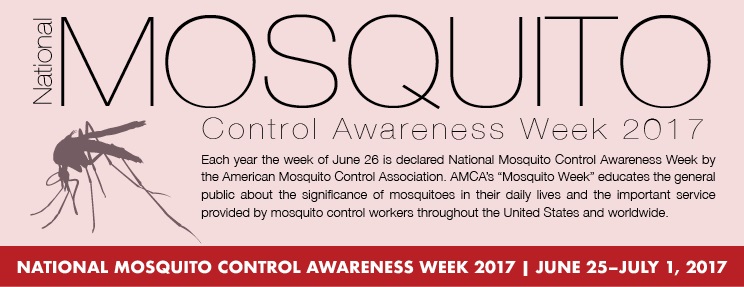Fourth of July is just around the corner, but itchy mosquito bites may already be a problem in your neighborhood. In honor of National Mosquito Control Awareness Week (June 25—July 2, 2017), the American Mosquito Control Association (AMCA) has tips to help you declare independence from those pesky blood-suckers.

Pools are open and grills are going, but are you cooking up a breeding ground for mosquitoes? Standing water and dark clothing are two things that attract them. AMCA recommends people follow the three D’s to keep mosquitoes away:
- Drain: Empty out water containers at least once per week
- Dress: Wear long sleeves, long pants, and light-colored, loose-fitting clothing
- Defend: Properly apply an approved repellent such as DEET, picaridin, IR 3535 or oil of lemon-eucalyptus
Make your yard a mosquito-free zone by: disposing of any tires — tires can breed thousands of mosquitoes; drilling holes in the bottom of recycling containers; clearing roof gutters of debris; cleaning pet water dishes regularly; checking and emptying children’s toys; repairing leaky outdoor faucets; and changing the water in bird baths at least once a week. Joseph Conlon, AMCA Technical Advisor, says, “Encouraging your neighbors to also eliminate sources on their own property is critical to a community-wide control program. Mosquitoes require water to complete their life cycle. If their water source is eliminated, so are their offspring.”
Mosquitoes are more than just a nuisance. Their bites can spread diseases such as Zika and West Nile Virus. “We already have the mosquitoes. We are continually importing the diseases they carry,” said Joseph Conlon, AMCA Technical Advisor. “We must be prepared to prevent their spread throughout our public health landscape – and this requires safe, effective, sustained mosquito control and awareness in the community.”
AMCA stresses mosquito-borne diseases do not only affect humans – they also kill countless birds, reptiles, animals and endangered species each year. Awareness of these parasites – including canine heartworm, Eastern Equine Encephalitis (EEE) and Western Equine Encephalitis – is another important component of mosquito control the general public must embrace.

